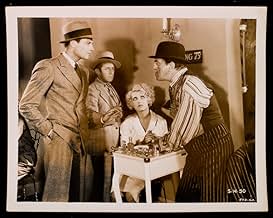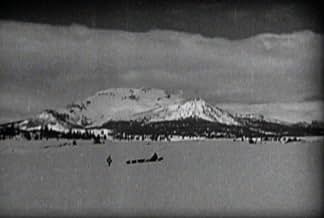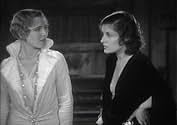Agrega una trama en tu idiomaA salmon fisherman has to choose between a bad girl and a society doll.A salmon fisherman has to choose between a bad girl and a society doll.A salmon fisherman has to choose between a bad girl and a society doll.
- Dirección
- Guionistas
- Elenco
William B. Davidson
- Tom Hilliard
- (as William Davidson)
Dick Curtis
- Fight Spectator
- (sin créditos)
Jimmy Dime
- Brawler
- (sin créditos)
Robert Homans
- Servant
- (sin créditos)
William H. O'Brien
- Waiter
- (sin créditos)
Dennis O'Keefe
- Night Club Patron
- (sin créditos)
Opiniones destacadas
Although I enjoy old movies, this was just a bit to early for my liking. It was an early talky movie and you could tell by watching it that the equipment that it was filmed on and the actors and actresses were vintage. That being said, it was an interesting movie and easy to watch. Very simplistic plot with not much depth as was the case in this period of cinematography. It was very typical of the time period plot line where the guy gets the girl, even though she has a reputation of being a bad girl. The scenes that showed the actual canning of the salmon was of interest to me, in that it gave a glance back in history of the processing plant and early machinery.
This film, originally made by RKO but fallen into the public domain, is probably not going to appeal to most people, and not even to most fans of precode. However, it is still interesting viewing. It was made in 1930 - that first full year of all-talking pictures, and we are beginning to see the end of some silent acting careers and the beginning of some talking ones.
The story is that of Boyd Emerson (Joel McCrea), a man who wanders into a very unfriendly Alaskan town. He practically breaks down the door of the town lady of the evening, Cherry Malotte (Evelyn Brent), and demands hospitality, which kind of spoils the idea behind hospitality in the first place. Boyd is in love with a society girl, Mildred Wayland (Jean Arthur), but needs to prove himself worthy to her dad before they can marry. He decides to make his home in this small Alaskan outpost and set up a salmon fishery to compete against that of his underhanded and better capitalized rival for Mildred's hand, Frederick Marsh.
Everyone from "San Francisco to Sitka" apparently knows about Cherry's profession, everyone but Boyd. Cherry uses her bodily assets at one point to insure Boyd gets the loan he needs to start his fishery, without Boyd knowing of course. When he finds out what Cherry does and that she did it at least once to help him, fireworks ensue.
Evelyn Brent was a holdover from the silents, and this is the best talking role I've seen her in. She delivers her hooker's manifesto speech to anemic society girl Mildred with gusto that rivals Barbara Stanwyck in "Baby Face". Jean Arthur is stiff as a board and unrecognizable here as the star of the screwball comedies that are to follow, and it is ironic that in spite of that stiff performance and Brent's animated one that Arthur's star is to rise and Brent's is to fall very shortly.
Louis Wolheim is another holdover from the silents. They just don't know what to do with him here and so they basically make him a mindless brute that enjoys busting heads open. He is much better served in 1931's "Danger Lights", and so is Jean Arthur for that matter.
The story is that of Boyd Emerson (Joel McCrea), a man who wanders into a very unfriendly Alaskan town. He practically breaks down the door of the town lady of the evening, Cherry Malotte (Evelyn Brent), and demands hospitality, which kind of spoils the idea behind hospitality in the first place. Boyd is in love with a society girl, Mildred Wayland (Jean Arthur), but needs to prove himself worthy to her dad before they can marry. He decides to make his home in this small Alaskan outpost and set up a salmon fishery to compete against that of his underhanded and better capitalized rival for Mildred's hand, Frederick Marsh.
Everyone from "San Francisco to Sitka" apparently knows about Cherry's profession, everyone but Boyd. Cherry uses her bodily assets at one point to insure Boyd gets the loan he needs to start his fishery, without Boyd knowing of course. When he finds out what Cherry does and that she did it at least once to help him, fireworks ensue.
Evelyn Brent was a holdover from the silents, and this is the best talking role I've seen her in. She delivers her hooker's manifesto speech to anemic society girl Mildred with gusto that rivals Barbara Stanwyck in "Baby Face". Jean Arthur is stiff as a board and unrecognizable here as the star of the screwball comedies that are to follow, and it is ironic that in spite of that stiff performance and Brent's animated one that Arthur's star is to rise and Brent's is to fall very shortly.
Louis Wolheim is another holdover from the silents. They just don't know what to do with him here and so they basically make him a mindless brute that enjoys busting heads open. He is much better served in 1931's "Danger Lights", and so is Jean Arthur for that matter.
After spending two, hard years searching for gold in the northernmost part of Alaska, two friends named "Boyd Emerson" (Joel McCrea) and "Fraser" (Raymond Hatton) finally decide to give up on their dream and head back south to civilization. On the way, however, they happen to stop in a small village where they meet a wealthy woman named "Cherry Malotte" (Evelyn Brent) who provides them with food and lodging for the next few days. It's during this time that Boyd is informed by Cherry that there is a lucrative business opportunity right there in that same village focusing on a totally different resource other than gold--salmon. The problem is that part of the bay where the salmon spawn is owned by a ruthless businessman named "Fred Marsh" (Gavid Gordon) who will do whatever it takes to prevent anyone else from setting up a rival fish cannery in that area. Even so, Boyd soon becomes intent upon opening one up and, with Cherry's help, he travels to Seattle to obtain the necessary money from a bank. While there he also runs into his girlfriend "Mildred Wayland" (Jean Arthur) who loves him very much and wants to marry him as soon as possible. What Boyd doesn't realize, however, is that Cherry has also fallen in love with him and that, sooner or later, he will have to make a choice between them. Now, rather than reveal any more, I will just say that this turned out to be a rather entertaining film--especially since it was produced so long ago. Admittedly, there were more than a few times the film showed its age, but even so, I enjoyed it for the most part and I have rated it accordingly. Slightly above average.
This is an excellent film. The location footage of Ketchikan, Alaska, the documentary scenes of salmon fishing and canning, and the clash on the water between the two fishing fleets are all first rate.
The crucial dramatic question of the film, can a decent man fall in love with a woman who has had sex with other men, seems hopelessly outdated. But if you replace that question with the more general, which woman should a man choose, one who can offer him a life of ease, or one who can help him fight for success on his own terms, the dramatic crisis becomes not dated but timeless. Good acting and direction, a lesson in the history of film, and in storytelling, that transcends period.
The crucial dramatic question of the film, can a decent man fall in love with a woman who has had sex with other men, seems hopelessly outdated. But if you replace that question with the more general, which woman should a man choose, one who can offer him a life of ease, or one who can help him fight for success on his own terms, the dramatic crisis becomes not dated but timeless. Good acting and direction, a lesson in the history of film, and in storytelling, that transcends period.
Fighting against great local opposition by going after THE SILVER HORDE - the magnificent schools of salmon which swarm past Alaskan shores - a decent young man finds himself caught between a bigoted society girl & a notorious prostitute.
A deft combination of action picture & soap opera, this early talkie boasts a fine, stalwart performance from a very young Joel McCrea, who displays some of the talents & charm which would soon make him a major star. A lively Evelyn Brent matches him dramatically as a lady with too much past. Poor Jean Arthur, in a strident, unsympathetic role, shows few hints of the celebrated comedienne she would become by the end of the decade.
Rough-hewn Louis Wolheim steals every scene he's in as a plug-ugly fisherman who's fiercely loyal to Miss Brent - here was an actor who was always fun to watch. Silent screen star Blanche Sweet makes one of her rare sound film appearances, playing a plain speaking harlot. Comic Raymond Hatton is amusing as a trapper with city slicker notions, while handsome Gavin Gordon makes a suave, dangerous villain.
Released in 1930, the first year of all-talkie films in Hollywood, THE SILVER HORDE displays its silent antecedents with the use of the occasional title card. This is not a weakness, however, and actually helps move the story along by explaining the plot a bit more fully.
Location filming on the Alaskan coast gives the ambiance of the film a terrific boost, while the scenes of catching & canning the salmon have a fascinating early-documentary feel to them.
A deft combination of action picture & soap opera, this early talkie boasts a fine, stalwart performance from a very young Joel McCrea, who displays some of the talents & charm which would soon make him a major star. A lively Evelyn Brent matches him dramatically as a lady with too much past. Poor Jean Arthur, in a strident, unsympathetic role, shows few hints of the celebrated comedienne she would become by the end of the decade.
Rough-hewn Louis Wolheim steals every scene he's in as a plug-ugly fisherman who's fiercely loyal to Miss Brent - here was an actor who was always fun to watch. Silent screen star Blanche Sweet makes one of her rare sound film appearances, playing a plain speaking harlot. Comic Raymond Hatton is amusing as a trapper with city slicker notions, while handsome Gavin Gordon makes a suave, dangerous villain.
Released in 1930, the first year of all-talkie films in Hollywood, THE SILVER HORDE displays its silent antecedents with the use of the occasional title card. This is not a weakness, however, and actually helps move the story along by explaining the plot a bit more fully.
Location filming on the Alaskan coast gives the ambiance of the film a terrific boost, while the scenes of catching & canning the salmon have a fascinating early-documentary feel to them.
¿Sabías que…?
- TriviaThe title refers to migrating salmon.
- ErroresWhen Balt is leaving, he drops his glove to shake hands with Cherry and never picks it up.
- Citas
Cherry Malotte: I'm Cherry Malotte! They know about me from San Francisco to Sitka. My reputation's got marks on it I couldn't rub off if I wanted to! I am what I am! I don't know how they finally settle things in this world or the next, but when the day comes I'll stand there with my chin up and take what's coming to me. And I wouldn't trade places with you, you white-livered, sweet-smelling hypocrite if they gave me a one-way ticket to Hell!
- ConexionesFeatured in Why Be Good? Sexuality & Censorship in Early Cinema (2007)
Selecciones populares
Inicia sesión para calificar y agrega a la lista de videos para obtener recomendaciones personalizadas
- How long is The Silver Horde?Con tecnología de Alexa
Detalles
Taquilla
- Presupuesto
- USD 423,000 (estimado)
- Tiempo de ejecución1 hora 15 minutos
- Color
Contribuir a esta página
Sugiere una edición o agrega el contenido que falta

Principales brechas de datos
By what name was The Silver Horde (1930) officially released in India in English?
Responda

































